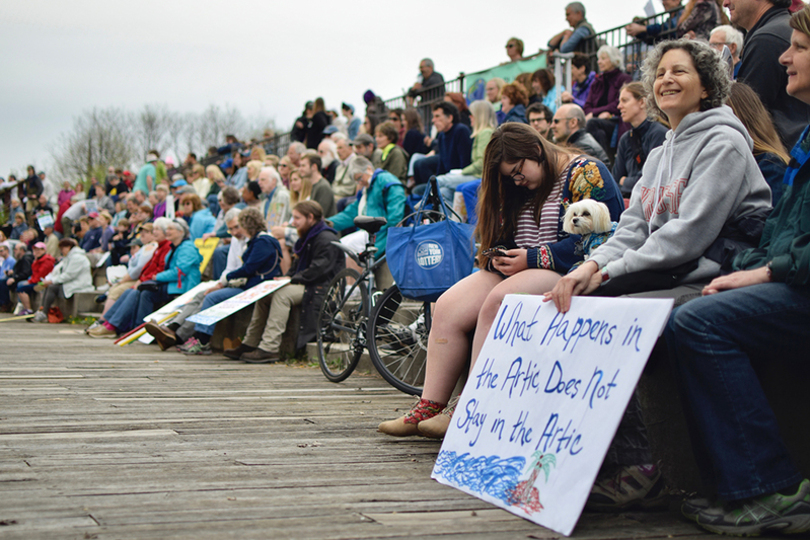Ask the Experts: New Zealand’s potential climate change refugee program

Morgan Bulman | Staff Writer
Professors said there could be an uptick in the number of refugees displaced by climate change in coming years.
UPDATED: Wednesday, Nov. 8, at 10:28 a.m.
Last week, New Zealand’s Green Party leader, James Shaw, announced the country is considering a new visa category for people displaced by climate change.
The Daily Orange spoke with Robert Wilson, a Syracuse University professor of geography with expertise in climate history and climate change politics, and Thomas Perreault, an SU geography professor, about this initiative and why it could be important right now.
The Daily Orange: What would be a current example of a climate change refugee?
Robert Wilson: Some experts have argued that the Syrian Civil War, that has been going on for five or six years, was partially caused by a severe drought in Syria around 2006 to 2009.
Basically the sequence of events was that people argued there was a severe drought in that part of the Middle East, people lost their farms and moved to cities in Syria, so all the people moving from the countryside to the city caused social instability and that in turn led to the civil war.
Some people have said that these people are ultimately climate refugees. Not necessarily everyone agrees with that, but that’s the clearest example, lately.
The D.O.: Why has granting people visas because of climate change been a controversial issue?
R.W.: It’s hard to identify what a climate change refugee would be. Take the example of a hurricane. Scientists are telling us that hurricanes are probably becoming stronger because of climate change.
It’s not necessarily that hurricanes are caused by it, but they might be more intense because of climate change. So let’s say that a hurricane hits an island and destroys homes and displaces people. Are they displaced due to climate change? Indirectly, probably. Climate change is making natural disasters that would’ve happened anyway, worse.
Thomas Perreault: I think a measure like this is really important and wish more countries would consider this. New Zealand is particularly progressive in terms of its social and environmental policies so it’s not surprising. It’s also relatively sparsely populated, but there are even more countries that are more sparsely populated that haven’t done that.
I think you also have to be careful about isolating certain causal factors of immigration or migration out of areas. In many cases, climate change will be one of many factors that drive this and it will be very difficult to identify climate change as the only cause.
The D.O.: What are the complications from climate change that could drive someone to seek asylum somewhere else?
R.W.: Flooding because of sea level rise. It’s clear that sea levels are going to rise significantly over the next century and that’s going to displace a lot of people. This is particularly true in island nations in the Pacific Ocean. The estimates are somewhere between three and six feet. Another one I think would be stronger hurricanes, and the third would be severe drought.
The D.O.: What types of people would be affected by this issue?
T.P.: The vast majority of refugees we have seen in recent years migrate either because of economic issues or because of conflict. What is expected because of sea level rise in particular, and also prolonged drought areas, is you’ll see an increase in the number of people who are essentially displaced because of environmental reasons.
We think about the recent hurricane season — Puerto Rico, parts of the Virgin Islands, Barbuda — some of the islands were absolutely devastated. There are going to be people who have to leave those areas for that, who aren’t going to be able to come back.
The D.O.: Is there a need for the United States to consider this policy as well? If so, what is the possibility that the United States would consider doing this?
R.W.: I think what is happening in New Zealand is also something that particularly wealthier countries are going to have to address. It’s clear that people in poorer countries are going to be displaced by climate change, so the question is what are wealthier countries going to do?
Are they going to accept refugees or are they going to build walls and implement legal barriers to prevent them coming? This is a fundamental issue that we will be dealing with in the 21st century.
There are a lot of places that are going to be lost due to climate change because of (sea) level rise. There will be people displaced in the U.S. due to sea level rise. Parts of Miami, New York City, Louisiana — all these low-lying areas are at stake.
There could be an internal displacement of people. Internationally, where are people going to go? Certainly the election of Donald Trump shows there is a strong anti-immigrant sentiment in the U.S.
I wouldn’t expect the Trump administration to allow climate-affected people into the U.S. To them, there can’t be such a thing as climate change refugees because in their views, climate change isn’t real.




